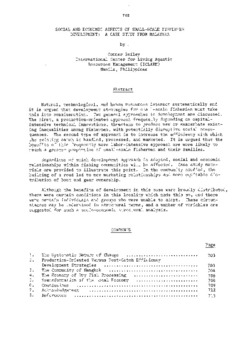Social and economic aspects of small-scale fisheries development: a case study from Malaysia

Citation
Bailey, C. (1980). Social and economic aspects of small-scale fisheries development: a case study from Malaysia. Proceedings of the Indo-Pacific Fishery Commission 19(III): 702-714
Natural, technological, and human resources interact systematically and it is argued that development strategies for small-scale fisheries must take this into consideration. Two general approaches to development are discussed. The first, a production-oriented approach frequently depending on capital-intensive technical innovations, threatens to produce new or exacerbate existing inequalities among fishermen, with potentially disruptive social conse-quences. The second type of approach is to increase the efficiency with which the existing catch is handled, processed, and marketed. It is argued that the benefits of this frequently more labor-intensive approach are more likely to reach a greater proportion of small-scale fishermen and their families. Regardless of which development approach is adopted, social and economic relationships within fishing communities will be affected. Case study materials are provided to illustrate this point. In the community studied, the building of a road led to new marketing relationships and more equitable dis-tribution of boat and gear ownership. Although the benefits of development in this case were broadly distributed there were certain conditions in this locality which made this so, and there were certain individuals and groups who were unable to adapt. These circumstances may be understood in structural terms, and a number of variables are suggested for such a socio-economic structural analysis.
Permalink
Date Available
Type
Publisher
Countries
Research Themes
Language